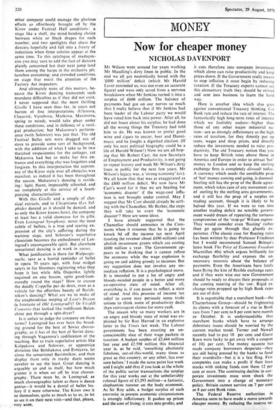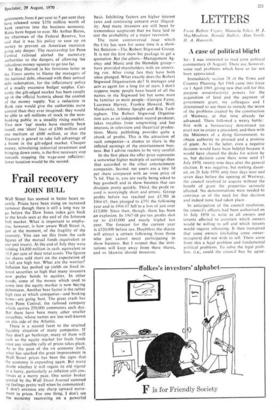MONEY Now for cheaper money
NICHOLAS DAVENPORT
Mr Wilson went around for years washing Mr Maudling's dirty linen in public. In the end we all got neurotically bored with the 1800 million' deficit (which Mr Harold Lever reminded us, was not even an accurate figure) and were only saved from a nervous breakdown when Mr Jenkins turned it into a surplus of £600 million. The balance of payments had got on our nerves so much that I really believe that if Mr Jenkins had been leader of the Labour party we would have voted him back into power. After all, he did not boast about his surplus; he had done all the wrong things the Treasury had told him to do. He was known to prefer good wine and cigars to soccer, beer and Danni- macs; and he fought a dignified election. (If only his next political biography could be a life of Harold Wilson!) Now we are all hop- ing that Mr Robert Carr, the new Secretary of Employment and Productivity, is not going to repeat history and wash Mr Wilson's dirty linen in public for the next few years. Mr Wilson's legacy was, a 'strong economy' (sic). We all know that that was as exaggerated as the £800 million deficit. We now have Mr Carr's word for it that we are heading for 'economic disaster' if the wage-cost infla- tion is not brought under control. May I suggest that Mr Carr should already be settl- ing with the Chancellor, Mr Barber, the steps they will take to avert the 'economic disaster'? Here are some ideas.
I have already suggested that the Chancellor should announce in the Com- mons when it resumes that he is going to knock 9d off the income tax next April (costing the revenue about £490 million) and abolish investment grants which are costing £600 million a year. The Government ap- pears to be thinking that it cannot reflate the economy while the wage explosion is going on and adding grossly to incomes. But my suggestion does not involve any im- mediate reflation. It is a psychological move. It is intended to put a lot of angry and bloody-minded people in a better and more co-operative state of mind. After all, everything is, if you pause to reflect, a state of mind. And this promise of income tax relief to come may persuade some trade unions to think more of productivity deals than extravagant claims for more cash.
The reason why so many workers are in
an angry and bloody state of mind was ex- plained by Sir Roy Harrod in an explosive letter to the Times last week. The Labour government has been exacting an un- conscionable slice of their wage packets in taxation. A budget surplus of £2,444 million last year and £2.598 million this financial year is, as he said, 'something absolutely fabulous, out-of-this-world, many times as great as this country, or any other, has ever seen before.' I made the same point last week and I might add tint if you look at the whole of the public sector transactions the surplus for this year works out at the unbelievably colossal figure of £5,293 million—a fantastic, elephantine tumour on the body economic. As Sir Roy adds, a budget surplus of such enormity in present economic circumstances is strongly inflationary. It pushes up prices and the cost of living; it cuts into profits; and it cuts therefore into company investment which alone can raise productivity and keep prices down. If the Government really means to stop inflation k must begin by reducing taxation. If the Treasury experts cannot see this elementary truth they should be retired and sent into business to learn the hard way.
Here is another idea which also goes against conventional Treasury thinking. Cut Bank rate and reduce the rate of interest. The fantastically high long-term rates of interest which we foolishly endure—higher than those of any other major industrial na- tion—are as strongly inflationary as the high
- rates of taxation, for they directly put up rents, wages and shop prices, and directly reduce the investment needed to raise pro- ductivity. The old Treasury notion that you have to keep British rates above those in America and Europe in order to attract 'hot' money to London and so keep the sterling exchange firm is completely demode today. A currency which needs the unreliable prop of 'hoe money coming and going, is doomed. Sterling still has the prop of the Basle agree- ment, which takes care of any movement out of sterling by the sterling area governments, and it still has the prop of a surplus on trading account, though it is likely to be halved this year. If we were to run into another trading deficit no sensible govern- ment would dream of repeating the tortuous compromises of the `stop-go' Wilson regime. They would consider even 'floating' rather than go again through that ghastly ex- perience. (The classic case for floating rates has been written by dear Professor Friedman but I would recommend Samuel Brittan's latest book The Price of Economic Freedom Macmillan 40s) which argues brilliantly for exchange flexibility and exposes the un- necessary neurosis about the balance of payments. Even the Americans have lately been flying the kite of flexible exchange rates and if they were wise our new Government should be ready to discuss their proposals at the coming meeting of the IMF. Rigid ex- change rates propped up by high Bank rates are out of date.
It is regrettable that a merchant bank—the Charterhouse Group—should be frightening its clients with a forecast of a rise in Bank rate from 7 per cent to 8 per cent next month or October. It is understandable that merchant banks which have to arrange debenture issues should be worried by the current market trend. Turner and Newall recently had to pay 10 per cent and Guest Keen were lucky to get away with a coupon of 10+ per cent. The money squeeze has made company borrowers desperate—they are still being pressed by the banks to fund their overdrafts—but it is a last fling. Few companies can make a profit if their loan stocks with sinking funds cost them 12 per cent or more. The continuing decline in cor- porate investment must soon shock the Government into a change of monetary policy. Britain cannot survive on 7 per cent or 8 per cent Bank rates.
The Federal Reserve authorities in America seem to have made a move towards cheaper money. By reducing the reserve re- quirements from 6 per cent to 5 per cent they have released some $350 million worth of bank reserves into the business economy. Rates have begun to ease. Mr Arthur Burns, the chairman of the Federal Reserve, has said that it was his policy to ease up on money to prevent an American recession going any deeper. The receivership for Penn Central railroad alerted the monetary_ authorities to the dangers of allowing the ridiculous money squeeze to go too far.
Sir Roy Harrod in his ferocious letter to the Times seems to blame the managers of the national debt, obsessed with their annual debt redemption, for the inflationary policy of a madly excessive budget surplus. Cer- tainly the gilt-edged market has been caught up in the official hysteria about the control of the money supply. Yet a reduction in Bank rate would give the authorities more control than they ever imagined; they would be able to sell millions of stock to the non- banking public in a steadily rising market. Two new 'tap' stocks have recently been issued, one 'short' loan of £300 million and one medium of £600 million, so that the Treasury is geared to take full advantage of a boom in the gilt-edged market. Cheaper money, stimulating industrial investment and bringing down rents, is the first necessary step towards stopping the wage-cost inflation: lower taxation would be the second.































 Previous page
Previous page